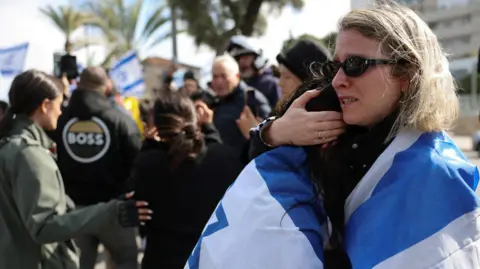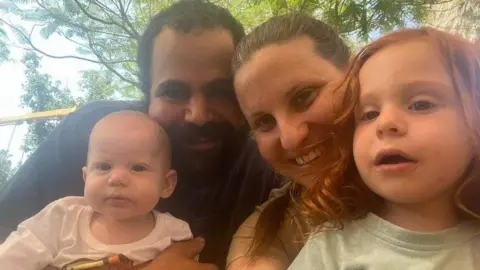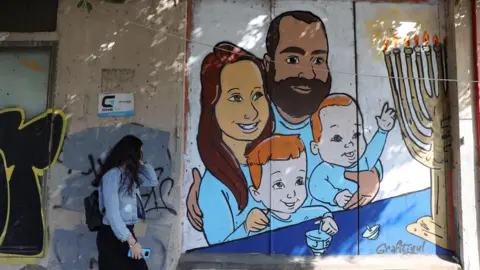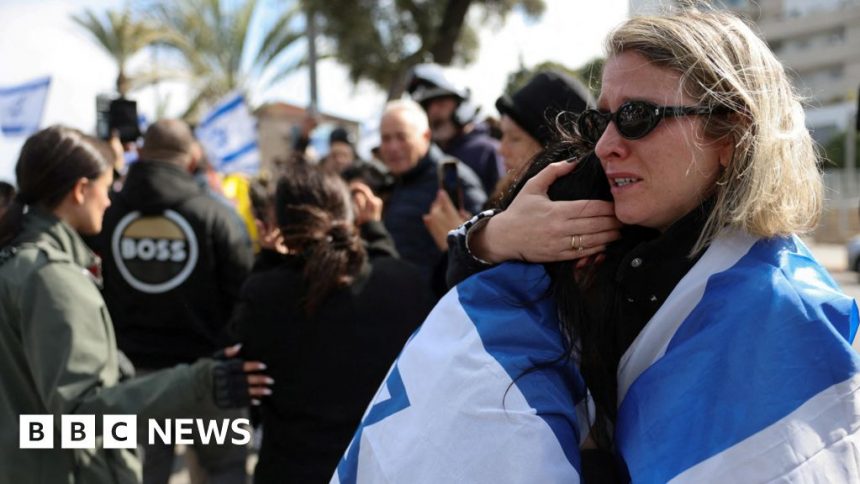‘The smallest coffins are the heaviest’: Israel grieves youngest hostages
 Reuters
ReutersKfir and Ariel Bibas were last seen on 7 October with their mother Shiri’s hands around them, holding onto her boys surrounded by gunmen and violence, trying to protect them. She couldn’t.
According to the Israeli army, Kfir and Ariel’s last moments were at the “bare hands” of their captors.
How do you eulogise children who have barely lived their lives?
Kfir Bibas, a hostage at just nine months old, did not live to take his first steps or celebrate his first birthday.
Ariel Bibas had only experienced four years of a life that should have been much longer.
A statement from Kibbutz Nir Oz, where the boys were taken hostage from, described Kfir as “a calm and smiley baby, with ginger hair and a laugh that would make anyone’s heart melt. Wherever he went he lit it up with his smile and joy.”
Ariel, they said, was “a playful boy with ginger hair, curious eyes and a big smile. He loved superheroes, tractors and cars, and ran non-stop, climbing and exploring the world.”
The two brothers became the greatest symbol of the hostage nightmare Israelis are enduring. Bringing home the Bibas family was a country’s fervent hope.
Throughout the last 16 months they have been remembered, prayed for, kept in the hearts of people, not just in Israel but by Jews and others across the world.
 FAMILY HANDOUT
FAMILY HANDOUTImages were shared of the boys in their Batman costumes with Ariel’s cape flying in the wind; of older brother Ariel hugging his baby brother Kfir when he was born; of Kfir giggling and gurgling as his father Yarden played with him.
And then the image seared into the minds since Hamas’s attack on 7 October: the boys clutching onto their mother Shiri Bibas, her face tormented in fear, as they were surrounded by gunmen and taken to Gaza.
No one in Israel wanted this ending; where Kfir and Ariel returned, not to their innocent childhood, but with their tender years already over. And where their mother who protected them until the last moment has not even returned with them.
In Israel, there is communal pain and grief.
In a video statement, the Israeli Prime Minister said Ariel and Kfir Bibas and 84-year-old Oded Lifschitz, whose body was also returned on Thursday, were “brutally murdered by Hamas savages.”
Holding up a picture of the boys, Benjamin Netanyahu said: “Today is a tragic day. It’s a day of boundless sorrow, of indescribable pain.
“Their bodies return home to a nation in mourning. A nation that will never forget and never forgive the evil that cut down these beautiful souls…The Bibas children in particular became the symbol of who we are, and who we’re fighting against.”
Netanyahu said: “Who kidnaps a little boy and a baby and murders them? Monsters. That’s who.”
Israel’s President Isaac Herzog said in a statement: “Agony. Pain. Our hearts — the hearts of an entire nation — lie in tatters.” He asked for forgiveness on behalf of the country for not protecting them and bringing them home.
Shiri, Ariel and Kfir Bibas were aged 32, four and nine months when they were kidnapped during the 7 October attacks.
About 1,200 people – mostly civilians – were killed in the attacks and 251 others taken back to Gaza as hostages. Israel launched a massive military campaign against Hamas in response, which has killed at least 48,297 Palestinians – mainly civilians – according to the Hamas-run health ministry.
This week, in Israel and abroad, people across social media posted images of broken orange hearts to represent the boys with the striking ginger hair.
On Thursday, as the vehicles with the bodies of the Bibas children and Oded Lifschitz crossed into Israel, people lining the streets with Israeli flags shouted out “sorry”.
 EPA
EPAIn October 2023 just weeks after they were kidnapped, the aunt of the Bibas brothers spoke to the BBC.
Ofri Bibas Levy described how Kfir had just started crawling and eating solid food.
“They are civilians and are not supposed to be there. The longer they are there the harder it’s going to be to recover them and the less chance they’re going to come out alive,” she said.
On Friday she wrote on Facebook: “I’m sorry Luli [Ariel], I’m sorry Firfir [Kfir].
“You did not deserve any of this. We will miss you forever. We are not giving up on your mum Shiri.”
In a video statement she added: “Shiri, Ariel, and Kfir were taken alive by a murderous terrorist organization, and it was Israel’s responsibility and obligation to bring them back alive.
“There is no forgiveness for abandoning them on October 7 and no forgiveness for abandoning them in captivity. Prime Minister Benjamin Netanyahu, we did not receive an apology from you in this painful moment. For Ariel and Kfir’s sake, and for Yarden’s sake, we are not seeking revenge right now. We are asking for Shiri.”
Yarden Bibas, who was only recently released as a hostage, must now bury his two young boys, with his wife Shiri still not returned by Hamas.
In Israel they are quoting words that painfully resonate: “The smallest coffins are the heaviest.”








